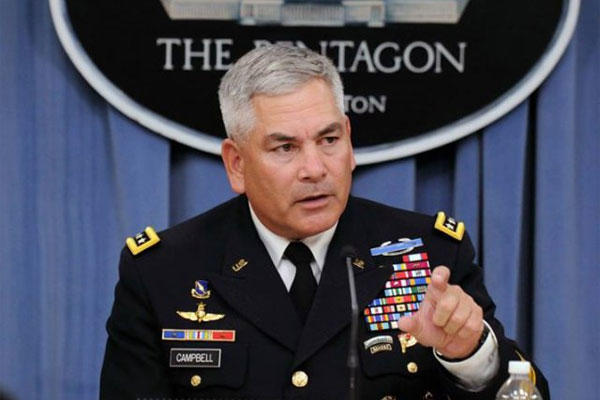Army Gen. John Campbell welcomed the decision Thursday to keep 5,500 U.S. troops in Afghanistan past 2016, saying their presence will demonstrate to the Taliban the futility of continuing the war.
At a later Pentagon briefing, Defense Secretary Ashton Carter said no decisions had yet been made on future deployment schedules or whether any of the 9,800 U.S. troops currently in Afghanistan would have their deployments extended.
He said those decisions would depend on how many troops NATO allies would also be willing to commit beyond 2016.
Campbell, the commander of U.S. and NATO forces in Afghanistan, said in a statement that keeping 5,500 in Afghanistan indefinitely "provides us the ability to further develop a lasting strategic relationship with our Afghan partners and allows us to counter the rise of violent extremism in a volatile part of the world."
The presence of U.S. forces could also eventually bring the Taliban to the bargaining table to renew talks with the Afghan government that were broken off with the announcement in September of the death of Taliban spiritual leader Mullah Omar, Campbell said.
The decision Thursday by President Obama to keep 5,500 troops in Afghanistan "serves notice to our common enemies -- their war against the legitimate Afghan Government, the Afghan people, the international community, and our shared values, remains futile," he said. "It is time for them to lay down their arms and enter the political process."
In a phone call Wednesday night, Obama informed Afghan President Ashraf Ghani, who had lobbied for a continued American presence, of his decision to keep 5,500 troops there indefinitely.
Afghan officials also welcomed the extension of an American troop presence that began shortly after the terror attacks of Sept. 11, 2001.
"It's very positive in light of the continued problems that this region is facing," said Mohammad Daud Sultanzoy, a presidential candidate in 2014 who is now allied with Ghani, The Washington Post reported.
"Our security (forces) have shown the will and capability to fight, but we still need the support of our allies, especially the United States," he said.
Carter said he also had pressed Obama to maintain a U.S. troop presence. He noted that more than 2,300 U.S. troops had been killed fighting in Afghanistan and said keeping troops there for counter-terror and training missions "honors that sacrifice and gives us the chance to finish what we've started."
Carter said the 5,500 troops would allow the U.S. to maintain bases at Kabul, at Bagram airfield north of Kabul, at Jalalabad in southeastern Afghanistan, and at Kandahar in the southwest.
Carter would not speculate on how long U.S. troops would remain past 2016. That decision was one "probably a future president will take," he said.
At the White House, Press Secretary Josh Earnest rejected criticism that Obama was simply handing off a problem he could not resolve to the next president.
Earnest said such critics "utterly fail to account for the situation the president inherited" when he came to office in 2009 from former President George W. Bush.
"I can tell you that politics played absolutely no role in the President's decision-making here," Earnest said in a conference call with reporters.
Laura Miller, the State Department's special envoy for Afghanistan and Pakistan, said Obama's decision "ensures continuity of our efforts to solve the problems in Afghanistan, not continuity of the problem."
In the conference call, Christine Abizaid, a deputy assistant secretary of Defense, said that the military was considering several options for possible changes in the rules of engagement for the troops staying past 2016 in light of the bombing of the hospital in Kunduz earlier this month that killed 22, including 12 staff members of the Doctors Without Borders aid group.
"So we'll be continuing to evaluate the progress in this fighting season and the next fighting season to determine if the current rules of engagement and use of our capabilities in theater is something that should persist beyond the post-2016 environment," Abizaid said.
Congressional critics generally welcomed a continued U.S. troop presence while questioning whether 5,500 troops were enough to carry out the counter-terror and training missions.
"I am concerned that the number of troops will not be sufficient to perform the critical tasks being set for them," said Sen. John McCain, R-Arizona, chairman of the Senate Armed Services Committee.
"It is highly unlikely that a force level of 5,500 troops was recommended as the best professional judgment of our senior military leaders and commanders on the ground in Afghanistan," McCain said in a statement.
Obama's decision was "a reminder that our national security strategy must be based on one thing -- conditions on the ground, not campaign promises," said Rep. Joe Heck, R-Nevada, chairman of the House Armed Services Personnel Subcommittee.
--Richard Sisk can be reached at Richard.Sisk@military.com.



























